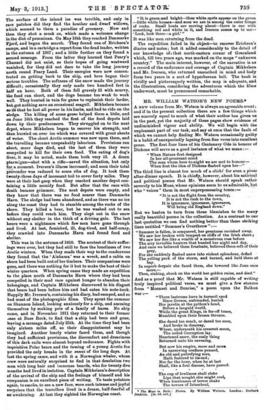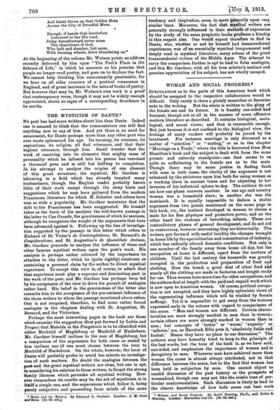MR. WILLIAM WATSON'S NEW POEMS.*
A NEW volume from Mr. Watson is always an agreeable event ; and if in the present collection there are a few things which are scarcely equal to much of what their author has given us in the past, yet the majority of these pages show evidence of undiminished vigour and ability. We will begin with the unpleasant part of our task, and say at once that the fault of which we cannot help finding Mr. Watson occasionally guilty is a habit of unexpectedly lapsing from fine verse into excellent prose. The first four lines of his Centenary Ode in honour of Dickens will serve as a good instance of what we mean;— "When Nature first designed
In her all-procreant mind The man whom here to-night we are met to honour— When first the idea of Dickens flashed upon her—"
The third line is almost too much of a cliche for even a prosy after-dinner speech. It is chiefly, however, about his satirical and political poems that Mr. Watson should speak rather severely to his Muse, whose opinions seem to us admirable, but
who " voices " them in most unprepossessing tones
"It is not the flight from the country, It is not the rush to the town, It is ignorance, ignorance, ignorance, Will bring old England down."
But we hasten to turn from these blemishes to the many really beautiful poems in the collection. As a contrast to our last quotation we can find nothing better than these striking lines entitled "Summer's Overthrow ":— " Summer is fallen, is conquered, her greatness ravished away. We saw her broken with tempest on cliffs of the Irish shore; We saw her flee like a wraith of a monstrous rose before The airy invisible hunters that hunted her night and day. And once we believed them frustrate, believed them reft of their
prey,
For she suddenly flashed anew into violent splendour, defied The yelling pack of the storm, and turned, and held them at bay. In superb despair she faced them, she towered like June once more,—
Then, sinking, shook on the world her golden ruins, and died."
And as a proof that Mr. Watson is still capable of writing truly inspired political verse, we must give a few stanzas from " Moonset and Sunrise," a poem upon the Balkan
war :—
"Three lustrums have in turmoil sped Since Greece, unfriended, hurled Her javelin at the python's head, Before a languid world, While the great Kings, in far-off tones, Mumbled upon their frozen thrones.
She dared too much, or dared too soon, And broke in disarray, Where, underneath his crescent moon, The coiled Corruption lay.
Heartened anew, the scaly thing Returned unto his ravening.
But now his empire, more and more In narrowing confines penned, An old and putrefying sore, Bath festered to its end;
Nor far the hour, when he at last Shall, like a foul disease, have passed.
• • The cup of lowliness shall slake Lips that nought else might cool, When hurricanes of terror shake The towers of Istamboul,
• The Muse in Exile : Poems. By William Watson. London : Herbert Jenkins. [3s. Gd. net.]
And blasts blown on that Golden Horn Arouse the City of Dreadful Morn.
Enough, if hands that heretofore Laboured to bar His road, Delay henceforward never more The charioteers of God, Who halt and slumber, but anon,
With burning wheels, drive thundering on."
At the beginning of the volume Mr. Watson prints an address recently delivered by him upon " The Poet's Place in the Scheme of Life," in which ho assumes as his premise that people no longer read poetry, and goes on to deplore the fact. We cannot help thinking him unnecessarily pessimistic, for we hear on all sides rumours of a poetical renascence in England, and of great increases in the sales of books of poetry. But however that may be, Mr. Watson's own work is a proof that contemporary verse, though it may not be widely enough appreciated, shows no signs of a corresponding decadence in its merits.



















































 Previous page
Previous page